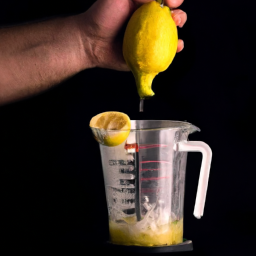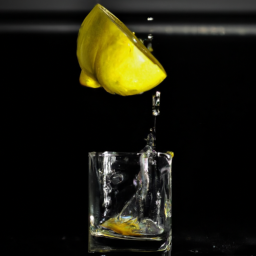Have you ever found yourself pondering, ‘Exactly how much juice can a single lemon yield?’
As someone who loves to cook and bake, I have definitely asked myself this question many times. Whether I need just a squeeze for a dressing or a whole cup for a recipe, knowing how much juice to expect from a single lemon is essential in the kitchen.
The amount of juice you can get from one lemon can vary depending on a few factors, such as the size and ripeness of the lemon, as well as the method used to extract the juice.
In this article, I will explore these factors and provide tips and tricks for getting the most juice out of a lemon. I will also share some common mistakes to avoid and recipes that use lemon juice as a key ingredient.
So, let’s get started and learn just how much juice we can expect from one lemon!
Key Takeaways
- The average amount of juice in one medium-sized lemon is 2-3 tablespoons.
- Accurate measuring is crucial for consistent results in cooking and baking, as using too much or too little lemon juice can greatly affect the taste and texture of a dish.
- One lemon yields about 3-4 tablespoons of juice, but it’s always best to measure to ensure accuracy.
- Fresh lemon juice is always preferred over bottled lemon juice, as it contains more nutrients and has a fresher taste.
Factors That Affect Lemon Juice Yield
The amount of juice you can get from one lemon depends on factors like its size, ripeness, and juiciness. These factors affect the yield of the lemon and can determine how much juice you can extract from it.
For instance, larger lemons will usually yield more juice than smaller ones, while ripe and juicy lemons tend to have more juice than unripe ones. To get the most out of your lemon, it’s crucial to use optimal juicing techniques.
First, make sure the lemon is at room temperature before squeezing it. This’ll make it easier to extract the juice. Next, roll the lemon on the countertop or press it with your palm to help break down the membranes inside. Finally, cut the lemon in half and use a citrus juicer or your hands to extract the juice.
By following these techniques, you can maximize the amount of juice you get from each lemon.
Moving on to the next section, let’s take a look at the average amount of juice in one lemon.
Average Amount of Juice in One Lemon
I want to talk about the average amount of juice in one lemon. This information can be helpful when making recipes that call for lemon juice.
Typically, one medium-sized lemon will yield around 2 to 3 tablespoons of juice, which is equivalent to about half a lemon. However, it’s important to note that the amount of juice can vary depending on the type of lemon used.
Measurements in Tablespoons and Cups
Wow, measuring ingredients in tablespoons and cups can be so convenient when making your favorite recipes, like squeezing just the right amount of juice from half a lemon! Measuring accuracy is crucial for producing consistent results in cooking and baking.
When it comes to lemon juicing techniques, using measurements can help you get the perfect amount of juice for your dish. Here are three helpful tips for measuring lemon juice:
-
Use a citrus juicer: A citrus juicer can help you extract the maximum amount of juice from your lemon while minimizing the amount of pulp and seeds that end up in your dish.
-
Squeeze it by hand: If you don’t have a juicer, you can still extract lemon juice by hand. Roll the lemon on a hard surface to loosen the juice, then cut it in half and use a fork to juice it into a measuring cup.
-
Strain the juice: If you don’t want pulp or seeds in your dish, strain the juice through a fine mesh sieve before using it.
By using these techniques and measuring accurately, you can ensure that you’re getting just the right amount of lemon juice for your recipe.
Now, let’s take a look at how different types of lemons compare in terms of flavor and juiciness.
Comparison Between Different Types of Lemons
Comparing different types of lemons can provide valuable insight into how their unique flavors and textures can enhance the taste of your dishes. Some of the most common types of lemons include Eureka, Lisbon, and Meyer lemons. Eureka lemons are known for their bright yellow color and acidic taste, while Lisbon lemons are slightly sweeter and have thicker skin. Meyer lemons, on the other hand, are smaller and have a more floral taste with a sweeter aroma.
When it comes to flavor profiles, lemons offer a wide range of tastes that can complement a variety of dishes. From savory to sweet, lemons can be used in everything from sauces and marinades to desserts and cocktails. In addition to their taste, lemons also offer a variety of nutritional benefits, including high levels of vitamin C and antioxidants that can help boost your immune system and improve your overall health. Incorporating different types of lemons into your cooking can be a simple way to add flavor and nutrition to your meals.
To get the most juice out of a lemon, there are a few tips you can follow. Without squeezing too hard, roll the lemon on a hard surface to help break down the fibers inside. You can also microwave the lemon for a few seconds to help soften it up. And if you’re really struggling, try submerging the lemon in warm water for a few minutes before juicing. By using these techniques, you can ensure that you’re getting the most out of your lemons and enhancing the flavor of your dishes.
Tips for Getting the Most Juice Out of a Lemon
Maximizing the amount of juice you can extract from a single lemon is a skill that can elevate any dish. Here are three tips for getting the most juice out of a lemon:
-
Roll the lemon on a hard surface before cutting it. This will break up the internal membranes and make it easier to extract the juice.
-
Microwave the lemon for a few seconds before juicing it. This will soften it up and make it easier to extract the juice.
-
Use a fork to poke holes in the lemon and then squeeze it. This will help you get more juice out of the fruit.
In addition to using lemon juice for cooking, there are many creative lemon recipes and non-cooking purposes for this versatile fruit. For example, lemon juice can be used to clean and disinfect cutting boards, remove stains from clothing, and brighten up your hair. With these tips, you can get the most out of your lemons and explore all the possibilities they have to offer. Speaking of getting the most out of your lemons, let’s talk about the tools you can use to juice them.
Tools for Juicing Lemons
If you’re hesitant to invest in a lemon juicer, don’t worry, you can still easily extract all the citrusy goodness with just a fork and some elbow grease. There are various juicing techniques that you can use to get the most juice out of your lemon. One technique is to roll your lemon on a hard surface, such as a countertop, before cutting it open. This helps to break down the cell walls inside the lemon, making it easier to extract the juice. After cutting the lemon in half, place it over a bowl with the cut side facing down and use a fork to press down and twist the lemon to release the juice. You can also use a citrus reamer or a handheld juicer if you prefer.
Choosing the right juicer is important if you plan on juicing lemons frequently. There are different types of juicers available, including electric and manual options. Electric juicers are more efficient and can handle larger quantities of lemons, but they are also more expensive. Manual juicers, on the other hand, are more affordable and are perfect for occasional use. Whichever juicer you choose, make sure it is easy to clean and use. With the right tools and techniques, you can easily extract all the juice from your lemons and enjoy their tangy flavor in your favorite recipes. When you’re done juicing your lemons, it’s important to store the juice properly to keep it fresh.
How to Store Lemon Juice
When it comes to storing lemon juice, I always make sure to refrigerate it immediately after juicing to keep it fresh for longer. If I have extra lemon juice that I won’t be using within a few days, I freeze it in ice cube trays for easy portioning in future recipes.
By following these simple steps, I can always have fresh lemon juice on hand for all my cooking and baking needs.
Refrigeration
Keeping your lemon juice in the refrigerator will help it stay fresh for longer! Here are some reasons why you should refrigerate your lemon juice:
- Preserves flavor: Refrigeration slows down the oxidation process that can cause lemon juice to lose its flavor.
- Prevents spoilage: Bacteria can grow in lemon juice left at room temperature, but refrigeration inhibits bacterial growth and keeps the juice safe to consume.
To ensure that your lemon juice stays fresh and flavorful, store it in an airtight container in the refrigerator. It will keep for up to a week. However, if you prefer the benefits of room temperature lemon juice, such as easier mixing with other ingredients, use it within a day or two of squeezing. Additionally, adding a pinch of salt can help preserve the flavor of room temperature lemon juice.
Moving on to freezing, there’s another way to preserve your lemon juice for even longer.
Freezing
To extend the shelf life of your citrusy elixir, try popping it in the freezer! Freezing techniques can preserve the freshness of lemon juice for up to six months.
Simply squeeze the juice from your lemons into an ice cube tray, and freeze until solid. Once frozen, transfer the cubes to a resealable freezer bag and store in the freezer.
Thawing lemon juice is easy: simply leave the desired amount of cubes in the refrigerator overnight to defrost. Using frozen lemon juice is a great way to always have fresh lemon on hand, without worrying about it going bad.
Plus, it’s a convenient way to add a citrusy punch to your favorite dishes and drinks. In the next section, we’ll explore other uses for lemon juice that go beyond the kitchen.
Other Uses for Lemon Juice
Lemon juice is a versatile ingredient that can be used beyond cooking. Here are some benefits for skincare and other uses for lemon juice:
-
Brighten your complexion: Lemon juice has natural skin lightening properties that can help even out your skin tone and reduce the appearance of dark spots.
-
Freshen your breath: Mix lemon juice with water and swish it around in your mouth to freshen your breath and kill bacteria.
-
Cleanse your hair: Mix lemon juice with water and use it as a final rinse after shampooing to help remove product buildup and leave your hair shiny.
-
Remove stains: Lemon juice can be used to remove stains from fabrics, countertops, and even cutting boards.
Using lemon juice in these non-culinary ways is a great way to get more use out of this versatile ingredient. However, it’s important to be aware of common mistakes to avoid when using lemon juice.
Common Lemon Juice Mistakes to Avoid
Don’t make these common mistakes when using this versatile ingredient – it’s important to know what to avoid! One of the most common mistakes people make when using lemon juice is not knowing how much to use. While it may seem like a small detail, using too much or too little lemon juice can greatly affect the taste and texture of your dish.
It’s important to note that the amount of lemon juice needed can vary depending on the recipe and personal preference. As a general rule, one lemon yields about 3-4 tablespoons of juice, but it’s always best to measure to ensure accuracy.
Another common mistake is using bottled lemon juice instead of fresh. While bottled lemon juice may be convenient, it often lacks the same flavor and acidity as fresh lemon juice. Additionally, bottled lemon juice may contain preservatives and additives that can alter the taste of your dish.
When possible, always opt for fresh lemon juice for the best taste and health benefits. While lemon juice has numerous benefits, it’s important to be aware of these common mistakes and drawbacks to ensure that you get the most out of this versatile ingredient.
When it comes to recipes that use lemon juice, there are countless options to choose from. From marinades and dressings to desserts and cocktails, lemon juice can add a bright and tangy flavor to any dish.
Let’s explore some of my favorite lemon juice recipes in the next section.
Recipes That Use Lemon Juice
So now that we know how much juice is in one lemon and how to avoid common mistakes when using it, let’s dive into some recipes that use lemon juice.
Before we get started, let’s do a quick recap of the key points we’ve covered so far. Additionally, I’ll share some final tips and recommendations, including whether you can use bottled lemon juice instead of fresh, how long lemon juice lasts, and whether you can juice a lemon ahead of time.
Recap of Key Points
Alright, let’s review the important details you need to know about the amount of juice in one lemon.
Lemon juice is a common ingredient used in cooking and baking. It adds a zesty flavor to dishes and helps balance out other flavors. Additionally, lemon juice is known for its health benefits, such as aiding digestion and boosting the immune system.
To get the most juice out of a lemon, it’s important to choose a ripe one that feels heavy for its size. Roll the lemon on a hard surface before cutting it to break the cells and release the juice. On average, one lemon produces around 3 tablespoons of juice. However, this can vary depending on the size and ripeness of the lemon.
Now that we’ve covered the basics of lemon juice, let’s move on to some final tips and recommendations for incorporating it into your cooking.
Final Tips and Recommendations
Now, if you’re looking to add some zing to your dishes, here are some final tips and recommendations for incorporating this citrus fruit into your cooking.
First and foremost, it’s important to note that there are alternative uses for lemon juice beyond cooking. For example, it can be used as a natural cleaner for surfaces, as a teeth whitener, and even as a natural insect repellent. So, if you have some extra lemon juice on hand, don’t be afraid to get creative with how you use it!
In terms of storage methods, lemon juice is best kept in an airtight container in the refrigerator. This will help to preserve its freshness and prevent it from becoming contaminated with bacteria.
It’s also worth noting that fresh lemon juice is always preferred over bottled lemon juice, as it contains more nutrients and has a fresher taste. However, if you’re in a pinch and don’t have access to fresh lemons, bottled lemon juice can be used as a substitute.
Can I Use Bottled Lemon Juice Instead of Fresh?
Using bottled lemon juice as a substitute for fresh can be a convenient option when fresh lemons are not available, but keep in mind that the taste and nutritional value may differ slightly. Bottled lemon juice often contains added preservatives and has been pasteurized, which can affect the flavor and nutrient content of the juice.
Additionally, bottled lemon juice may not provide the same level of acidity as fresh lemon juice, which can impact the outcome of certain recipes. When using bottled lemon juice as a substitute, it’s important to check the ingredient list and choose a brand that contains only lemon juice and no added sugars or artificial flavors.
While bottled lemon juice may not provide the same flavor and nutritional benefits as fresh lemon juice, it can still be a suitable option for recipes that do not require a strong lemon flavor. As we move on to the next section about how long lemon juice lasts, it’s important to note that the shelf life of bottled lemon juice may differ from fresh lemon juice.
How Long Does Lemon Juice Last?
So, we’ve established that using bottled lemon juice instead of fresh is not always the best option. But what about fresh lemon juice? How long can we keep it before it goes bad?
Well, the answer to that question depends on a few factors. The best storage methods for lemon juice are to keep it in an airtight container in the refrigerator. When stored properly, lemon juice can last for up to 2-3 days. However, if you want to extend the shelf life of your lemon juice, you can freeze it in ice cube trays and use it as needed. When frozen, lemon juice can last for up to 4-6 months. It’s important to note that fresh lemon juice will lose some of its flavor and potency over time, so it’s best to use it as soon as possible.
Using lemon juice for cooking is a great way to add some acidity and flavor to your dishes. Whether you’re making a marinade, salad dressing, or using it to brighten up a soup or stew, fresh lemon juice is a versatile ingredient that can be used in many different ways. Just remember to always use fresh lemon juice whenever possible, as it will have the best flavor and nutritional value.
Speaking of using fresh lemon juice, can you juice a lemon ahead of time? Let’s find out in the next section.
Can I Juice a Lemon Ahead of Time?
If you’re looking to save time in the kitchen, you may be wondering if it’s possible to juice a lemon ahead of time. The answer is yes, you can juice a lemon ahead of time.
However, there are some things you should keep in mind to preserve the flavor of the pre-juiced lemons. One of the benefits of using fresh lemon juice is that it has a bright, tangy flavor that can add a refreshing zing to any dish.
When you juice a lemon ahead of time, the flavor can start to diminish over time. To preserve the flavor of pre-juiced lemons, it’s best to store the juice in an airtight container in the refrigerator.
You can also add a small amount of lemon zest to the juice to help enhance the flavor. By doing this, you can still enjoy the benefits of fresh lemon juice without having to juice a lemon every time you need it.
Frequently Asked Questions
Can I use bottled lemon juice instead of fresh lemon juice?
As someone who loves to cook, I’ve experimented with both bottled and fresh lemon juice in my recipes. While bottled juice may be convenient, it doesn’t compare to the bright, zesty flavor of fresh juice. Trust me, your dishes will thank you for using the real deal.
How long can I store fresh lemon juice in the refrigerator?
I store fresh lemon juice in an airtight container in the fridge for up to a week. To prevent spoilage, I recommend using a clean utensil each time you pour out the juice. Lemon juice can be used in many recipes, including marinades, dressings, and cocktails.
Can I freeze fresh lemon juice?
Yes, fresh lemon juice can be frozen for up to 6 months. Freezing citrus is a great way to have lemon juice on hand for using in recipes. Just be sure to label and date the container before freezing.
Does the ripeness of the lemon affect the amount of juice it yields?
As I experimented with juicing techniques, I discovered that the ripeness of a lemon can impact the amount of juice it yields. Riper lemons tend to be juicier, but also have a sweeter taste.
Are there any health benefits to drinking lemon juice?
Lemon juice benefits include aiding digestion, boosting immunity, and promoting hydration. It can be used in various lemon juice recipes, such as lemonade and salad dressings, to add flavor and nutrition to your diet.
Conclusion
Well, there you have it folks. The average amount of juice in one lemon is about 2-3 tablespoons, but there are many factors that can affect the yield, such as the ripeness of the fruit and the juicing method used.
To get the most juice out of your lemons, try using a citrus juicer or rolling the lemon on a hard surface before cutting it open. And don’t forget to store any leftover juice in an airtight container in the fridge for later use.
Lemon juice isn’t only a popular ingredient in cooking and baking, but it also has many other uses, such as cleaning and as a natural remedy for various ailments. So the next time you have a lemon on hand, don’t underestimate its potential. With a little bit of effort, you can get the most out of this versatile fruit.
Ilana has been a vegan for over 10 years. She originally made the switch for health reasons, but soon found herself becoming more and more passionate about the ethical and environmental implications of a vegan lifestyle. Ilana is the author of The Graceful Kitchen, a blog all about veganism. She loves to cook up delicious and nutritious vegan meals, and share her recipes with others who are interested in leading a cruelty-free life. Ilana is also a strong advocate for using whole foods as the foundation of a healthy diet, and believes that going vegan is one of the best ways to achieve this.










